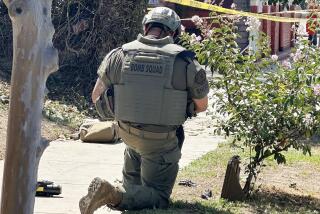Libya Embassy Gave Grenades for Attack on U.S. Club: Turkey
ANKARA, Turkey — Two Libyans arrested in an alleged conspiracy to bomb a U.S. officers’ club were helped by Libyan Embassy personnel who provided the hand grenades, a prosecutor said today.
The arrested Libyans, identified as Ali Ecefli Ramadan and Recep Muhtar Rohoma Tarhuni, both 30, were captured April 18 near the U.S. officers’ club in the residential district of Gaziosmanpasa.
They were carrying a bag containing six grenades, State Security Court Prosecutor Ulku Coskun said.
The two men were formally arrested Sunday on charges of forming a conspiracy to kill a group of people. Coskun said the two will be tried in about two weeks.
If convicted, they could be sentenced to 12 to 20 years in prison.
Coskun said two Libyan Embassy employees delivered the hand grenades to the suspects after the weapons had been brought into Turkey under cover of diplomatic immunity.
Attache and Guard
He identified the embassy employees as Saban Muhammed Hasan, the embassy’s administrative attache, and Abdulhafit Hadi Sadun, a security guard.
The prosecutor said the state security court has issued arrest warrants for the two embassy employees as well as another Libyan official he identified as Umran Mansur, director of the Libyan Arab Airlines office in Istanbul.
All three left the country after the two Libyans were discovered with the grenades, he said.
The prosecutor alleged that Mansur had determined the target of the attack and sent the two-man hit team to Ankara from Istanbul.
The state security court, a special court to try terrorism cases and other crimes against the state, did not press charges against two other Libyans because of insufficient evidence.
Held in Detention
Coskun said the two, Ali Abdulhadi Shalmi and Bashir Mabruk Ibrahim, would remain in detention until authorities determine what action, if any, would be taken against them.
The U.S. officers’ club in this NATO-member nation was filled with about 100 people attending a wedding on the day the Libyans were found with the grenades, and just one of the Soviet-manufactured grenades could have killed or injured 50 people, Coskun said.
“There could have been a massacre,” he said.
More to Read
Sign up for Essential California
The most important California stories and recommendations in your inbox every morning.
You may occasionally receive promotional content from the Los Angeles Times.










